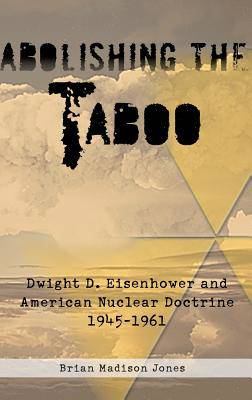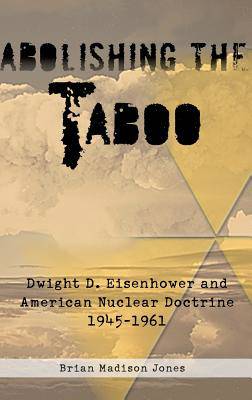
- Afhalen na 1 uur in een winkel met voorraad
- Gratis thuislevering in België vanaf € 30
- Ruim aanbod met 7 miljoen producten
- Afhalen na 1 uur in een winkel met voorraad
- Gratis thuislevering in België vanaf € 30
- Ruim aanbod met 7 miljoen producten
Zoeken
Abolishing the Taboo
Dwight D. Eisenhower and American Nuclear Doctrine, 1945-1961
Brian Madison Jones
€ 69,95
+ 139 punten
Omschrijving
In Abolishing the Taboo, Brian Madison Jones takes a new look at the integral role played by Dwight D. Eisenhower in the creation of a new nuclear creed for the United States during the Cold War. The author centers the narrative on Eisenhower, the man, the general, and the president, with specific focus on his intellectual and political understanding of nuclear technology in general and nuclear weapons in particular. Abolishing the Taboo presents an analysis of Eisenhower's thinking about nuclear weapons since 1945 as well as a survey of nuclear developments from 1953-1961. With heavy reliance upon archival research at the Eisenhower Presidential Library in Abilene, Kansas as well as published works by Eisenhower and his confidants, Abolishing the Taboo evidences how Dwight D. Eisenhower came to believe that nuclear weapons and nuclear technology were permissible and desirable assets to help protect U.S. national security against the threat of international communism. Through an analysis of Eisenhower's words and actions, Jones shows how and why Eisenhower sought to make nuclear weapons as available, useful, and ordinary for purposes of national security as other revolutionary military technology from the past, such as the tank. Jones describes Eisenhower's assessment of the role and value of nuclear technology as profound, sincere, and pragmatic, but also simplistic, uneven, and perilous and explains that Eisenhower consistently advanced his view that strength through nuclear technology was possible, necessary, and sustainable. Abolishing the Taboo shows how Eisenhower sought to reverse the perception that nuclear weapons were inherently dangerous by advocating steadily and consistently for the proper and acceptable use of nuclear technology to contribute to the safety of the republic. The president conceived policies such as the New Look, massive retaliation, Project Plowshare, and Atoms for Peace in part to convince the American public and the international community of the U.S.'s genuine desire for peace as Eisenhower simultaneously entrenched atomic and thermonuclear weapons into the American national conscience, according to the author. Jones concludes that Eisenhower, more than any other single figure, expanded the role played by nuclear technology in American life and became the primary architect of the new American nuclear creed that made nuclear weapons and nuclear technology ordinary, abundant, and indispensable to U.S. national security in the postwar period.
Specificaties
Betrokkenen
- Auteur(s):
- Uitgeverij:
Inhoud
- Aantal bladzijden:
- 176
- Taal:
- Engels
- Reeks:
Eigenschappen
- Productcode (EAN):
- 9781909384057
- Verschijningsdatum:
- 19/04/2013
- Uitvoering:
- Hardcover
- Formaat:
- Genaaid
- Afmetingen:
- 152 mm x 229 mm
- Gewicht:
- 422 g

Alleen bij Standaard Boekhandel
+ 139 punten op je klantenkaart van Standaard Boekhandel
Beoordelingen
We publiceren alleen reviews die voldoen aan de voorwaarden voor reviews. Bekijk onze voorwaarden voor reviews.








